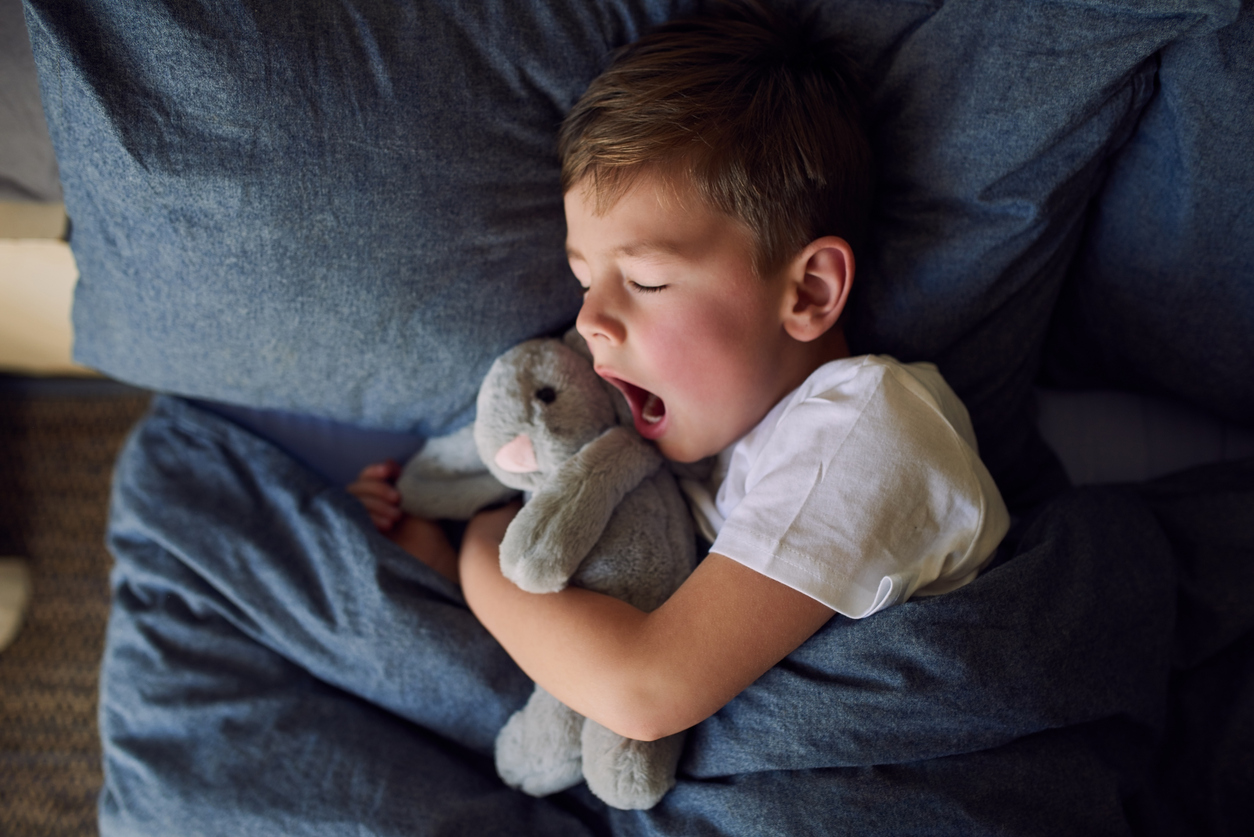Kid’s Sleep Schedules on Summer Vacation

How to Protect Your Child’s Sleep This Summer
Amid summer vacations, now more than ever kids are soaking up the summer sun. From sleepaway camps, vacations, daytime activities, and s’mores by the campfire, schedules are jam-packed and becoming more relaxed and carefree.
As a result, consistent sleep schedules are tough to manage for both parents and children alike. Inconsistent sleeping schedules, coupled with summer’s scorching temperatures and longer daylight hours, make it difficult to obtain enough restorative sleep.
Recommendations & the Importance of Sleep for Kids
The amount of sleep needed varies by age. The American Academy of Pediatrics (AASM) and the American Academy of Pediatrics (AAP) recommend the following:
- Ages 3–5: 10–13 hours of sleep per night
- Ages 6–12: 9–12 hours per night
- Ages 13–18: 8–10 hours per night
Recent studies continue to affirm the vital role of sleep in childhood development. According to 2023 CDC data, nearly 78% of high school students and over 65% of middle school students report insufficient sleep on school nights—figures that have worsened slightly compared to the previous decade (CDC, 2023).
Sleep is essential for supporting:
- Emotional regulation and mental health
- Learning and memory consolidation
- Immune function and physical growth
- Healthy weight and metabolism
A 2024 meta-analysis emphasized that consistent, age-appropriate sleep strongly correlates with higher academic performance and fewer behavioral problems in children and teens (Hirshkowitz et al., 2024).
How Is Sleep Impacted During the Summer Months?
Sleep tends to suffer during the summer for children and teens. A 2023 review revealed:
- Children and adolescents sleep 30–60 minutes less per night on average during the summer.
- Sleep onset latency increases due to later sunsets and relaxed routines.
- Sleep fragmentation becomes more common, particularly in hotter environments (Minges et al., 2023).
These small disruptions can have long-term impacts. For instance, a 2024 study showed that even one hour of reduced sleep per night over the summer increases the risk of weight gain, mood disturbances, and decreased physical activity levels (Lopez et al., 2024).
Emerging research links summer routines with the Structured Days Hypothesis. Structured school days promote regulated sleep-wake patterns, physical activity, and meal timing. During summer, kids experience:
- Fewer scheduled physical activities
- Increased screen time
- Irregular meal and bedtime routines
This combination contributes to sleep loss and, in turn, impacts health. Several studies confirm that children often return to school in the fall with increased BMI, behavioral issues, and reduced academic readiness (Wang & Grigg, 2025).
Fortunately, a consistent takeaway from the research is this: Parental awareness and involvement matter. A 2023 study found that when parents were educated about sleep hygiene and sleep routines, children experienced significantly better sleep quality—even during less-structured months like summer (SleepScore Labs, 2023).
How To Get Sleep Back On Schedule
Here are evidence-backed tips to restore structure and help your family sleep well this summer:
- Consistency is Key
Maintain regular wake-up and bedtime schedules, even on weekends. Teenagers experience a natural circadian phase delay, meaning they naturally want to sleep and wake up later. Allow for some flexibility but maintain consistent sleep windows to avoid major shifts coming fall.
- Think Dark or Dim
Evening light delays melatonin production. Begin dimming lights 2–3 hours before bed. Use blackout curtains, limit screen use, and consider blue light–blocking glasses or screen filters. A 2024 study confirmed that light exposure before bedtime delays sleep onset in children by up to 40 minutes (Patel & Richardson, 2024).
- Keep Cool
The ideal room temperature for sleep is 60–67°F (15.5–19.4°C), but comfort varies individually. In hotter climates or during heat waves, consider fans, breathable bedding, or cooling mattress pads. A 2023 study found that sleep onset and duration improved significantly with just a 2°F temperature reduction in children’s rooms (Nguyen et al., 2023).
How SleepScore Can Help
Download the free SleepScore App for insights and articles on how well you sleep, the quality and quantity of your sleep cycles, and sleep improvement progress with science-backed tips and insights. Download the app for free from App Store and Google Play Store!
Sleep well!
Sources:
- Centers for Disease Control and Prevention. (2023). Youth Risk Behavior Survey. https://www.cdc.gov/healthyyouth/data/yrbs/index.htm
- Hirshkowitz, M., Raj, N., & Franco, J. A. (2024). Pediatric sleep and school performance: A meta-analysis. Sleep Health. https://www.sciencedirect.com/science/article/pii/S2352721824000453
- Minges, K. E., Brown, C., & Bakken, R. (2023). Seasonal shifts in pediatric sleep patterns: A systematic review. Journal of Child Psychology and Psychiatry. https://onlinelibrary.wiley.com/doi/10.1111/jcpp.13890
- Lopez, A., Bergstrom, R., & Chang, Y. (2024). Sleep loss, obesity, and activity reduction in adolescents: A summer-specific review. Pediatrics. https://pediatrics.aappublications.org/content/early/2024/03/15/peds.2023-059841
- Wang, S., & Grigg, J. (2025). Structured days and childhood wellness: Revisiting the hypothesis with longitudinal data. Sleep Medicine Reviews. https://www.sciencedirect.com/science/article/pii/S1087079225000374
- Patel, N., & Richardson, L. (2024). Evening light and delayed sleep onset in school-aged children. Chronobiology International. https://www.tandfonline.com/doi/full/10.1080/07420528.2024.1987745
- Nguyen, T., Lee, A., & Solomon, K. (2023). Thermal environment and sleep onset in children during summer. Sleep Science and Practice. https://sleep.biomedcentral.com/articles/10.1186/s41606-023-00115-1
- SleepScore Labs. (2023). Parental sleep education and childhood sleep outcomes. https://www.sleepscore.com/blog/how-parent-sleep-knowledge-helps-kids/